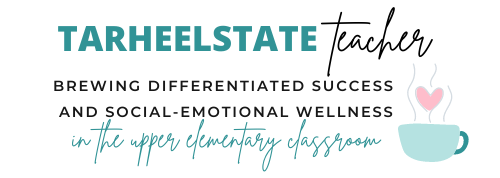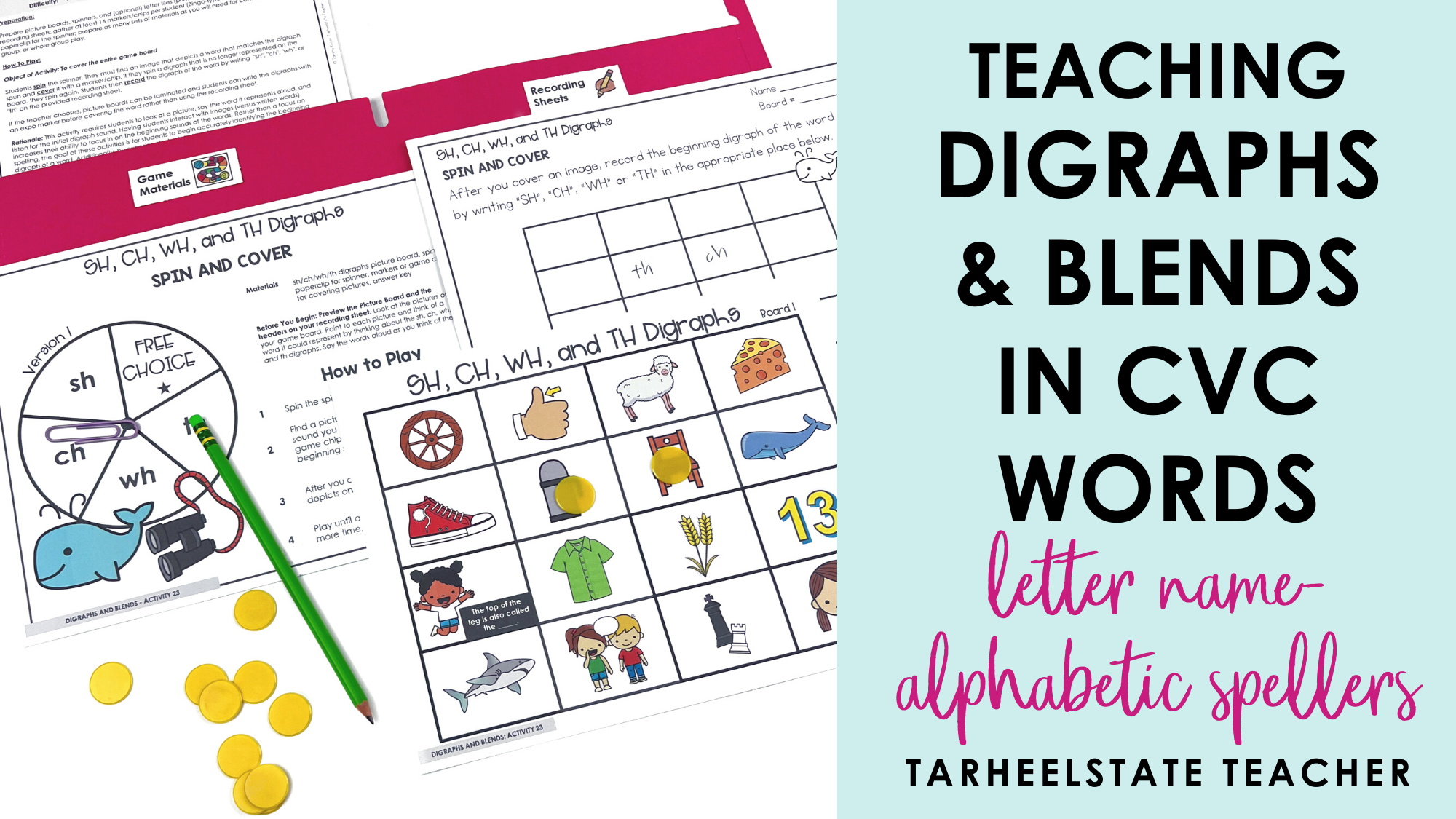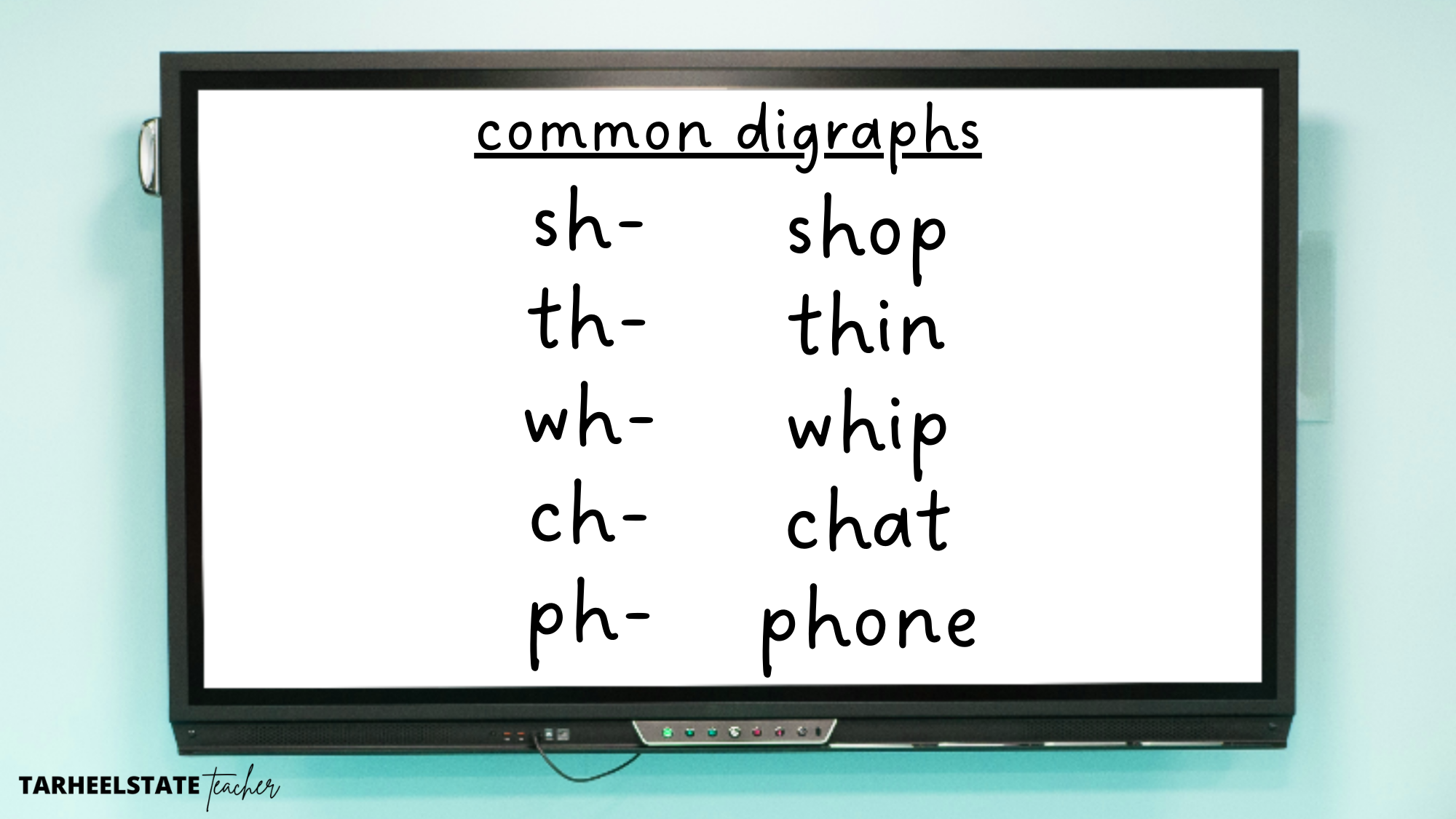Teaching Beginning Digraphs and Blends in CVC Words - Letter Name-Alphabetic Spellers
Are you getting ready to dive in to introducing beginning digraphs and blends to your Letter Name-Alphabetic Spellers? Let this blog post be your go-to guide for defining digraphs and blends, highlighting examples that you can use with your students, information on when you should expect students to be ready to learn about digraphs and blends, and ready to implement activities that benefit students working with beginning digraphs and blends!
WHAT IS A DIGRAPH?
A digraph is two letters that when paired together represent one single sound. Digraphs can include a combination of consonants or vowels. Consonant digraphs can come at the beginning or end of a single-syllable word, while vowel digraphs are often found in the middle of words.
Some common digraphs include sh, th, wh, ch, and ph.
WHAT ARE SOME EXAMPLES OF WORDS WITH DIGRAPHS?
Shop, thin, whip, and chat are all words that begin with digraphs. The first two letters are not pronounced as two individual sounds (s-h-o-t), but instead as one single sound (sh-o-t).
WHAT IS A BLEND?
A blend is when two or three letters are fused together so that each individual consonant sound can be heard, but are pronounced quickly to blend together. In the word plop, the p and the l can both be heard, but are pronounced together as a blend instead of like p-l-op.
WHAT ARE SOME EXAMPLES OF WORDS WITH BLENDS?
Stop, smell, drill, plum, and grass are all words that begin with a blend. The first two letters are not pronounced as two individual sounds (s-t-o-p), but are blended together (st-o-p) while still being able to hear both consonant sounds.
WHEN ARE STUDENTS READY TO LEARN ABOUT DIGRAPHS AND BLENDS?
Students are ready to work with beginning digraphs and blends after they have success with accurately identifying and spelling three-letter CVC words including the beginning consonants, medial vowels, and final consonants (tap, bed, pig, cop, pup, etc).
Need tips for supporting students in all phases of the Letter Name-Alphabetic stage? Get those here!
WHICH DIGRAPHS AND BLENDS SHOULD BE TAUGHT FIRST?
Students should be introduced to the most common digraphs and blends first, simply because they will encounter them more often in their reading.
The most common digraphs that are typically introduced first include sh, th, ch, and wh. The most common beginning blends that are typically introduced to students first include bl, br, cl, br, dr, fr, tr, fl, gl, gr, pl, pr, sl, sm, sp, and st.
Because students have already been heavily working with beginning consonant sounds in CVC words, it can help them to bridge their understanding by comparing words with a newly introduced digraph or blend to words that begin with similar single beginning consonant sounds.
For example, instead of introducing all of the common digraphs (sh, ch, wh, and th) together, try introducing one at a time with other CVC words that have similar beginnings. For instance, students can more easily grasp the digraph sh in words like ship, shop, and shell when they are able to compare it with words beginning with s like sun or saw and words beginning with h like ham or hose. This helps them hear the difference in singular beginning consonant sounds and the digraph, allowing them to apply what they've previously learned to the new skill they are developing.
Words Their Way suggests the following pairings and order when introducing digraphs to students:
1 - S, H, and SH Digraph - sun, saw, hand, horse, shirt, ship
2 - J, H, and CH Digraph - jar, jet, hat, horn, chin, chick
3 - H, SH, and CH Digraphs - ham, house, sheep, shave, chop, chest
4 - TH and WH Digraphs - thermos, think, whip, whale
5 - SH, CH, WH, and TH Digraphs - shoe, shelf, cheese, chain, wheat, wheel, thorn, thumb
When introducing beginning blends, Words Their Way suggests the following pairings and order:
1 - S, T, and ST Blend - six, sink, tie, top, stop, stir
2 - SP, SK, and SM Blends - spider, spool, skate, skull, smell, smile
3 - SC, SN, and SW Blends - scout, score, snake, snow, swing, swan
4 - P, L, and PL Blend - pig, pan, log, lamp, plug, plate
5 - SL, BL, and PL Blends - sled, sleep, block, blade, pliers, plane
6 - CR, CL, FR, and FL Blends - crab, crib, clip, clap, fry, frame, flag, float
7 - BR, BL, GR, and GL Blends - broom, brush, blade, blow, grass, grill, glass, glove
8 - PR, DR, and TR Blends - present, pray, drip, dream, trap, truck
9 - WH, QU, TW, and K - wheel, whisker, queen, quilt, twins, twist, key, kick
* Note: I've linked each of these digraphs and beginning blends to resources that can be used to teach these skills. You can find the bundle for teaching Digraphs and Blends here.
* A Word of Caution: Students at this developmental stage should not be expected to accurately spell words beyond simple CVC words beginning with a digraph or blend. For example, students should be able to spell chop or plop once they have been introduced to the ch digraph and pl blend because they already know how to spell cop and pop.
However, CVCe words like blade or whale are vowel patterns that students have not typically been introduced to yet. In words such as these, they should be expected to identify and spell the beginning digraph or blend and to make an attempt at the other parts, but not be held accountable or assessed for the skill that isn't being taught at this time.
WHAT TYPES OF ACTIVITIES BENEFIT STUDENTS WORKING ON DIGRAPHS AND BLENDS?
Any game or activity that engages students in identifying, sounding out, sorting, building, and writing beginning digraphs and blends is a valuable use of their time. The more of these ways of interacting with the words can be included in one activity, the better!
That's exactly why I love games like Chase the Whale to practice and review the sh, ch, wh, and th digraphs. In this game, students take turns drawing picture cards and finding the ending/rime of the word on the board that matches the picture card drawn. Students mentally fill in the missing digraph to find a spot to cover on the game board. Game play involves friendly competition and a recording sheet that makes it easy for the teacher to check that students understood the digraphs of their particular game.
Spin and Cover is another game that allows students to practice identifying, sounding out, sorting, and writing blends without focusing on spelling the word in its entirety. In this particular Spin and Cover activity, students choose a picture board from the 4 versions and spin to cover an image of an SC, SN, or SW blend on their board. Then, students then record the blend of the word they covered on their recording sheet.
In addition to the games providing more exposure and practice with beginning digraphs and blends, adding the games and play-based activities has invited some much needed variety and engagement to our word study block.
Check out all the games and activities I have for students working with Digraphs and Blends in CVC words here.
YOU ARE THE KEY TO THEIR SUCCESS!
This is the first time students are introduced to the concept that one sound may be represented with two letters. Mastering the successful use of digraphs and blends in words is a BIG step for our students! When you recognize the importance of this developmental milestone, you can enjoy scaffolding students as they unlock a new door in their understanding of this essential word study concept! Get ready for those lightbulb moments that help your students grow as readers and writers!
Have students in the Letter Name-Alphabetic Stage that are ready to work on other concepts? Check out these helpful posts:
Supporting Students in the Letter Name-Alphabetic Stage
Teaching Beginning Consonants Letters and Sounds
Teaching Phonics Word Families
Teaching Short Vowels in CVC Words
Teaching Preconsonantal Nasals in CVC Words
LOOKING FOR MORE LETTER-NAME ALPHABETIC RESOURCES?
You can get all of the Letter Name-Alphabetic Stage games in a time-saving, money saving bundle!
NOTE: The Letter Name word searches and word study notebook are also included in bundles for all 4 levels of Words Their Way if you need those!





